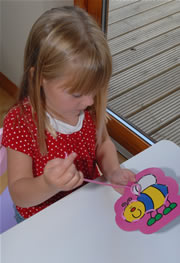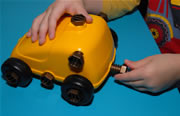Developing Motor Skills - how to help your child with Hand Skills (Fine Motor Skills)

The information on this page is also available to download:
Fine motor skills are used in all daily activities for example dressing, brushing your teeth, drawing, writing and playing with toys. It is important that children develop these skills to help them with school and other everyday living activities.
The activities suggested here may help your child with these skills. It is important to chose activities that you and your child enjoy. Many can be done during normal daily routines like car journeys, bathing or while you are busy in the kitchen. Most toys can be used for a wide range of age groups as children will experience them in different ways appropriate to their age.
Activities to encourage using 2 hands together and hand control:
Stacking and building
- Building blocks
- Jenga games
- Stacking cups
- Stacking rings on a post
- Building towers from everyday things and household ‘junk’
Lacing and threading activities

- Sewing cards
- Threading macaroni, cotton reels and big button onto a lace
- Threading lace through hole punched cards or pictures
- Making jewellery
Cutting, tearing and folding
- Tearing and cutting cards and paper for collages
- Making paper mache
- Making cards for people
- Paper folding, aeroplanes and origami
- Cutting Play Doh
Construction activities
- Lego, Meccano, K-Nex, Geo–Max, Brio, Stickle Bricks etc.
- Simple woodwork
- Simple models
Winding, twisting and screwing 
- Wind up toys
- Games with a windup timer
- Big Meccano sets or early tool sets
- Screwing and unscrewing containers such as storage jars and tubs to keep toys in
Activities to encourage using fingers, developing fine grasps and hand-eye co-ordination:
Finger Activities
- Finger songs and clapping games
- Finger painting with sand, shaving foam, paint
- Finger games ‘racing’ fingers along surface
- Using fingers on musical instruments
- Picking up objects as quickly as you can
- Scrunching up paper just with your fingers
In-hand manipulation activities
- Screwing up paper into little balls for collages
- Picking up coins for the play till, Tiddly Winks, Hama Beads and other small items
- Putting pen tops on and off
- Play Doh – rolling balls and sausages
Tweezer games
- Picking up and moving things using tongs and blunt ended tweezers
- Pegging out dolls clothes or pictures on string
- Bed Bugs or Operation type games
Puzzles
- Peg puzzles
- Interlocking puzzles
- Jigsaws
- Peg board games
Board games
- Many commercially available games require you to move small pieces and sometimes have a timed element.
- Many games require precision and skill rather than speed
Drawing and writing
- Pencil activities like early scribbling on paper on chalk board
- Water painting books
- Dot to dots and mazes
- Colouring simple pictures
- Using chalks on chalk board or paving slabs
- Crayons on different materials e.g. card, light paper, woodchip wallpaper
- Using stampers or sponge painting
- Using etch a sketch and magic boards

